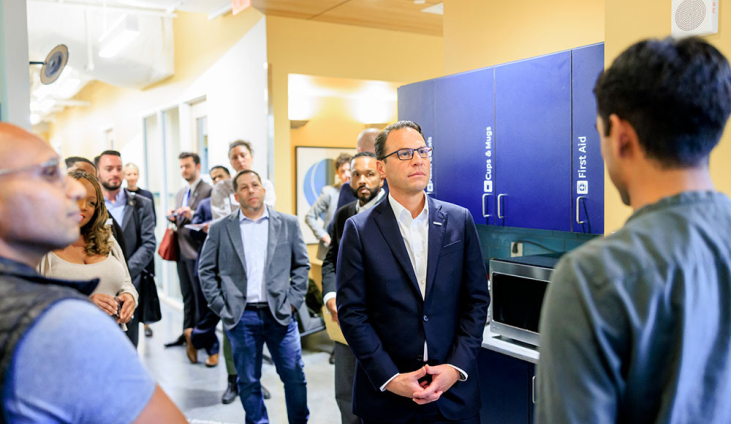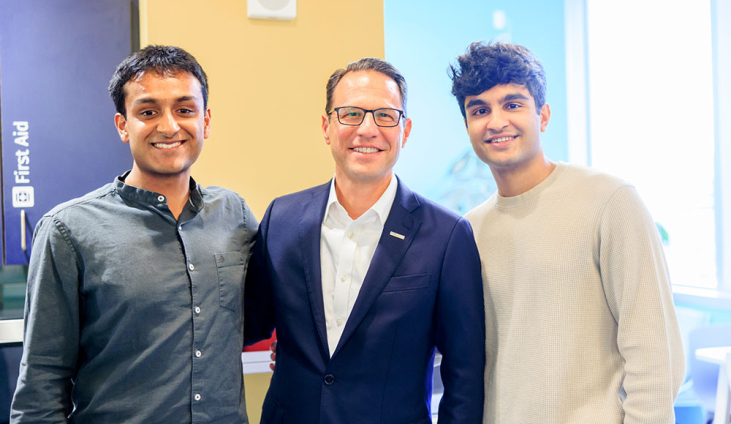He notes that a single gallon of the blood rings in at $60,000, raising the cost of medical tests that require it – and as a keystone species, harvesting the horseshoe crab has a negative ecological impact. “So maybe somewhat naively at the time, I thought: why not make a better method?”
A childhood mission becomes a business reality
The problem was that the crab blood – which is reactive to potentially life-threatening endotoxins – serves an important role in medicine and medical device testing. Therefore, an alternative was required.
In the beginning, Aravind’s quest to engineer a plant-based replacement to the horseshoe crab’s blood was simply a high-school project – a way to familiarize himself with the life sciences space and get experience in the laboratory. An enterprising Aravind was able to access lab space thanks to generous local professors. By 12th grade, he had a working basic prototype using the genetically engineered Arabidopsis plant.
But he assumed that starting college would mean packing up the concept and moving on to classroom work.
As a first-year student at the University of Pennsylvania, however, Aravind continued to have conversations with his professors about the product’s potential – and they encouraged him to develop the idea further. Aravind teamed up with other first-year students to officially launch his business ToxiSense, and they ultimately won the 2022 Venture Lab Startup Challenge, Penn’s largest pitch competition.
Then Aravind heard about the Science Center’s Founders Fellowship. The Founders Fellowship gives entrepreneurs in the life science space the resources and knowledge needed to turn an idea into a business venture. Along with a $50,000 stipend, founders receive access to space at CIC Labs, hands-on learning, as well as mentorship from experienced entrepreneurs in the space.
From research to business strategy
Due to the rigorous requirements of organizations like the FDA and the U.S. Pharmacopeia, business acumen is essential for getting pharmaceutical-related products off the ground. It’s no secret that researchers often lack business experience – and many would-be products never come to market because the scientists that created them fail to anticipate regulatory and economic hurdles.
That’s where the Founders Fellowship comes in. It isn’t just about giving entrepreneurs funding – it also provides them with the business know-how they need to truly succeed in this competitive space.
“The Fellowship gives people with a scientific background the ability to translate their scientific research from the lab into a real-world ready product,” Aravind explains. “I had a good idea of how to conduct this type of research in the lab, but the Fellowship taught me how to talk to eventual customers, discover market pain points, work on pricing, address regulatory requirements, establish IP - all the different things that scientists often don't consider as part of rigorous basic scientific research.”
Fellowship work reveals a second use case
During his Fellowship year, Aravind conducted extensive customer research and customer discovery, talking to clinicians and infectious disease researchers both locally and around the world. This led him to realize there was a second use case for his product: developing a more rapid test to see whether bacterial infections are present in a patient’s bloodstream.
Current testing methods require 2-3 days to conduct on average. In the meantime, doctors are unsure how to treat patients and often prescribe broad-spectrum antibiotics, which can lead to other problems (like antimicrobial resistance). Developing a rapid test using ToxiSense’s technology could significantly improve patient outcomes by reducing the time it takes to correctly treat them - not to mention reducing treatment costs.
“From a high-level standpoint, honing in on these two main market areas that we want to target has really helped us to de-risk our go to market strategy,” Aravind explains.
“I had a good idea of how to conduct this type of research in the lab, but the Fellowship taught me how to talk to eventual customers, discover market pain points, work on pricing, address regulatory requirements, establish IP - all the different things that scientists often don't consider as part of rigorous basic scientific research.”
The hurdles aren’t over
What’s next for ToxiSense? In the short term, they’re continuing to refine their test kit technology and finishing the necessary R&D. ToxiSense plans on running clinical pilot tests at hospitals here in Philadelphia, and then later overseas.
In the long term, Aravind explains that a time and capital-intensive review process awaits them – companies can spend over $500,000 on average obtaining regulatory approval from the U.S. Pharmacopeia.
“We need to make sure we have enough data to be rigorously evaluated, and make sure the technology is up to their standards - it's a necessary hurdle we need to overcome,” he explains. “That's why we're trying to obtain all the data we need to both from our R&D in the lab, and also from pilot testing going forward to get through that process.”
ToxiSense will also have to convince clinicians that using their technology will improve patient outcomes and decrease costs. Luckily, Aravind has received extensive advice from mentors involved in the Fellowship as to how to proceed.

“As an undergraduate student building a company in such a technology-heavy field like biotech, I think it's really important to have a strong network of supportive mentors, who bring expertise from their respective fields, around you to effectively help you to translate your ideas into something you can bring into reality,” notes Aravind. “I'm grateful for all the mentorship I've received throughout this from the Founders Fellowship.”
His advice for up-and-coming entrepreneurs?
“Think outside of the box and be unorthodox in how you imagine new ideas,” he recommends, “But also take the time to be extremely methodical, rigorous, and data driven in your research processes as you test the merit of these ideas. Let the data speak for itself, and essentially – do well by doing good science."





